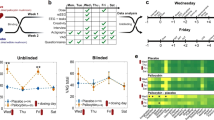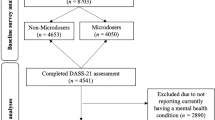Abstract
Background/Objectives:
The aim of this study was to evaluate the validity and reliability of the Main Meal Quality Index when applied on the UK population.
Subjects/Methods:
The indicator was developed to assess meal quality in different populations, and is composed of 10 components: fruit, vegetables (excluding potatoes), ratio of animal protein to total protein, fiber, carbohydrate, total fat, saturated fat, processed meat, sugary beverages and desserts, and energy density, resulting in a score range of 0–100 points. The performance of the indicator was measured using strategies for assessing content validity, construct validity, discriminant validity and reliability, including principal component analysis, linear regression models and Cronbach’s alpha.
Results:
The indicator presented good reliability.
Conclusions:
The Main Meal Quality Index has been shown to be valid for use as an instrument to evaluate, monitor and compare the quality of meals consumed by adults in the United Kingdom.
This is a preview of subscription content, access via your institution
Access options
Subscribe to this journal
Receive 12 print issues and online access
$259.00 per year
only $21.58 per issue
Buy this article
- Purchase on Springer Link
- Instant access to full article PDF
Prices may be subject to local taxes which are calculated during checkout
Similar content being viewed by others
References
World Cancer Research Fund, American Institute for Cancer Research. Food, Nutrition, Physical Activity, and the Prevention of Cancer: a Global Perspective. AICR: Washington DC, USA, 2007.
World Health Organization. Diet, nutrition and the prevention of chronic diseases. World Health Organ Tech Rep Ser 2003; 916: 1–60.
U.S. Department of Agriculture.. . A series of systematic reviews on the relationship between dietary patterns and health outcomes. Center for Nutrition Policy and Promotion. USDA: Virginia, USA, 2015..
Gorgulho B, Pot GK, Sarti FM, Fisberg RM, Marchioni DM . Measuring quality of meals: development of an index to be used in multicultural context. Ann Nutr Metab 2015; 67 (Suppl 1), 235–236.
Leech RM, Worsley A, Timperio A, McNaughton SA . Understanding meal patterns: definitions, methodology and impact on nutrient intake and diet quality. Nutr Res Rev 2015; 28: 1–21.
Guenther PM, Reedy J, Krebs-Smith SM, Reeve BB . Evaluation of the healthy eating index-2005. J Am Diet Assoc 2008; 108: 1854–1864.
Public Health England, Food Standards Agency. National Diet and Nutrition Survey: results from Years 1 to 4 (combined) of the Rolling Programme for 2008 and 2009 to 2011 and 2012. UK Data Archive; 2014. Available at: https://www.gov.uk/government/statistics/national-diet-and-nutrition-survey-results-from-years-1-to-4-combined-of-the-rolling-programme-for-2008-and-2009-to-2011-and-2012.
Kaiser HF . The varimax criterion for analytic rotation in factor analysis. Psychometrika 1958; 23: 187–200.
Cattell RB . The scree test for the number of factors. Multivariate Behav Res 1966; 1: 245–276.
Cronbach LJ . Coefficient alpha and the internal structure of tests. Psychometrika 1951; 16: 297–334.
Santos JRA . Cronbach’s alpha: a tool for assessing the reliability of scales. J Ext 1999; 37: 1–5.
Acknowledgements
This study was funded by the Brazilian Council for Scientific and Technological Development (process number 142341/2013-4) and by the Sao Paulo Research Foundation (process number 2014/19355-6).
Author information
Authors and Affiliations
Corresponding author
Ethics declarations
Competing interests
The authors declare no conflict of interest.
Rights and permissions
About this article
Cite this article
Gorgulho, B., Pot, G. & Marchioni, D. Evaluation of the psychometric properties of the main meal quality index when applied in the UK population. Eur J Clin Nutr 71, 674–676 (2017). https://doi.org/10.1038/ejcn.2016.175
Received:
Revised:
Accepted:
Published:
Issue Date:
DOI: https://doi.org/10.1038/ejcn.2016.175



